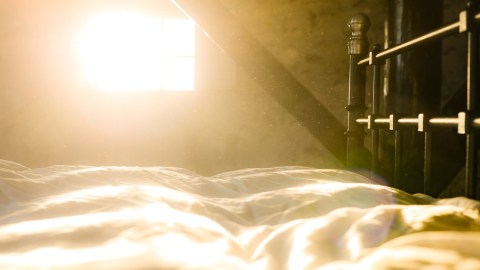Waking up early linked to a reduction in depression

One of the great scientific advancements of this century involves our growing understanding of just how complex and necessary sleep is. What for most of history was a natural consequence of circadian rhythms has, beginning with the Industrial Revolution and perpetuating during the Technological Revolution, become something we have to schedule and practice, to make time for. As it turns out, we should be making more time for it.
Still, many of us are doing it wrong. Forty percent of Americans get less than seven hours of sleep per night, which is an hour shorter than our great-grandparents received. That’s not good—we should average between seven and nine. Track the decades and a disturbing trend emerges: in 1942, only 3 percent received less than five hours per night; in 2013, 14 percent.
You’ve likely seen the studies. A lack of sleep contributes to obesity, diabetes, heart disease, memory problems (including Alzheimer’s), mood changes, basic cognitive functioning, high blood pressure, balance issues, immune problems, and reduced sex drive, to name a few. By design, we’re destined to spend one-third of our lives unconscious. Rebelling against that fact serves no one well.
A new study from the University of Colorado at Boulder adds to the list: middle-aged and older women who go to bed and rise early significantly reduce the likelihood they’ll develop depression.
More than 32,000 nurses were included in the largest chronotype study on the necessity of sleep to date. Nurses make great candidates for such a study, given their intense working hours, emotional problems dealing with the sick and dying, and artificial hospital lights. (My two years working in an emergency room left me depressed and irritated, which I attributed to lighting, as well as the occasional 11pm-7 am shift.)
Previous studies have linked night owls to an increased risk of depression. (To be fair, as Daniel Pink points out in his book, When: The Scientific Secrets of Perfect Timing, a small percentage of humans really do function well going to bed early in the morning and rising in the afternoon.) In this study, night owls—10 percent of the nurses studied—were also less likely to be married and more likely to smoke, both telling factors in overall health.
Your chronotype deals with how underlying circadian rhythms affect your behavior. If you sleep well you’re part of the “morningness” group, while night owls are in the “eveningness” camp. For this study, 37 percent were in the former, 53 percent in the middle, and, as mentioned, 10 percent in the latter.
The study shows that the early crew has a 12-27 percent reduction in developing depression. While genetics plays a role in chronotype, researchers note that lighting is important, as well as factors like exercise, smoking, and spending time outside. Still, the chronotype effect is statistically significant.
Why this is has been partly answered in another study, this one from UT Southwestern Medical Center. Researchers investigated two sets of mice in order to better understand the molecular nature of sleep. One “mutant” group, called Sleepy, has a genetic mutation that forces them to sleep more than other mice. The other group was sleep deprived. The researchers measured the molecular process of phosphorylation to understand what proteins are affected by sleep deprivation.
The researchers identified a total of eighty proteins, which they dubbed Sleep-Need-Index-Phosphoproteins (SNIPPs). The phosphorylation of these proteins increased with deprivation and decreased during sleep. Interestingly, a majority are regulators of synaptic plasticity, which makes sense given that cognitive functioning declines when you don’t sleep enough. Associate Professor Dr. Qinghua Liu believes SNIPPs represent the molecular connection between sleeping and wakefulness they’ve been looking for.
The purpose of sleep-wake balance appears to be to maximize the duration and quality of cognitive (thinking) functions of the brain. While prolonged wakefulness leads to cognitive impairment and sleepiness, sleep refreshes the brain through multiple restorative effects and optimizes cognitive functions for the next waking period.
These two studies, as with all research in this domain, end the same way, with the advice that we need to sleep more. But you already know that. Pinpointing the molecular nature of sleep and why a lack of it contributes to depression is good knowledge, but useless until you put it into practice. Given all the risks of powering through the night, avoiding sleep just makes no sense.
—
Stay in touch with Derek on Facebook and Twitter.




